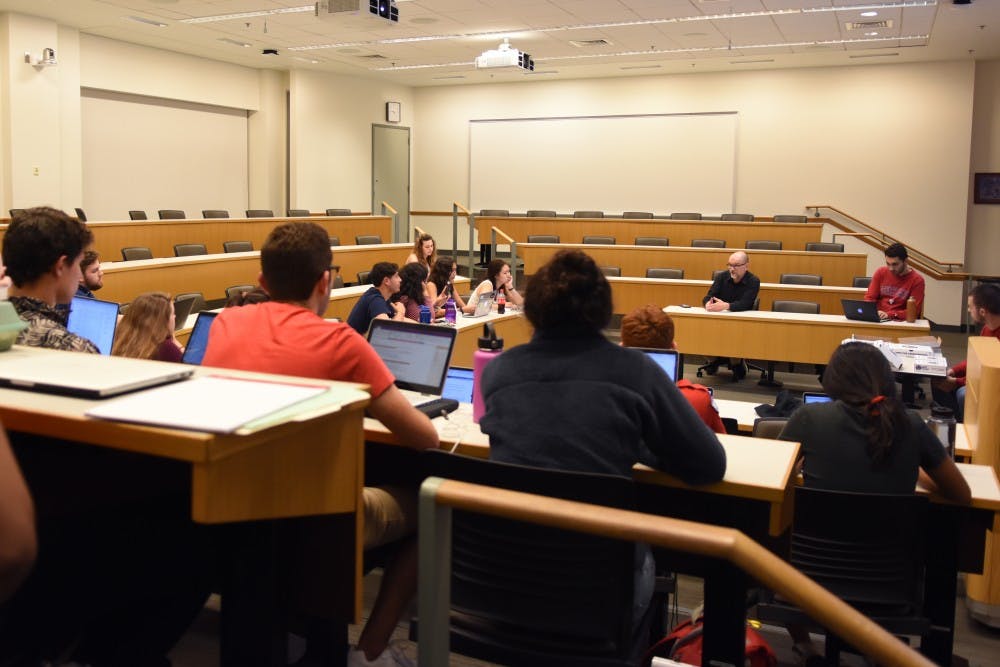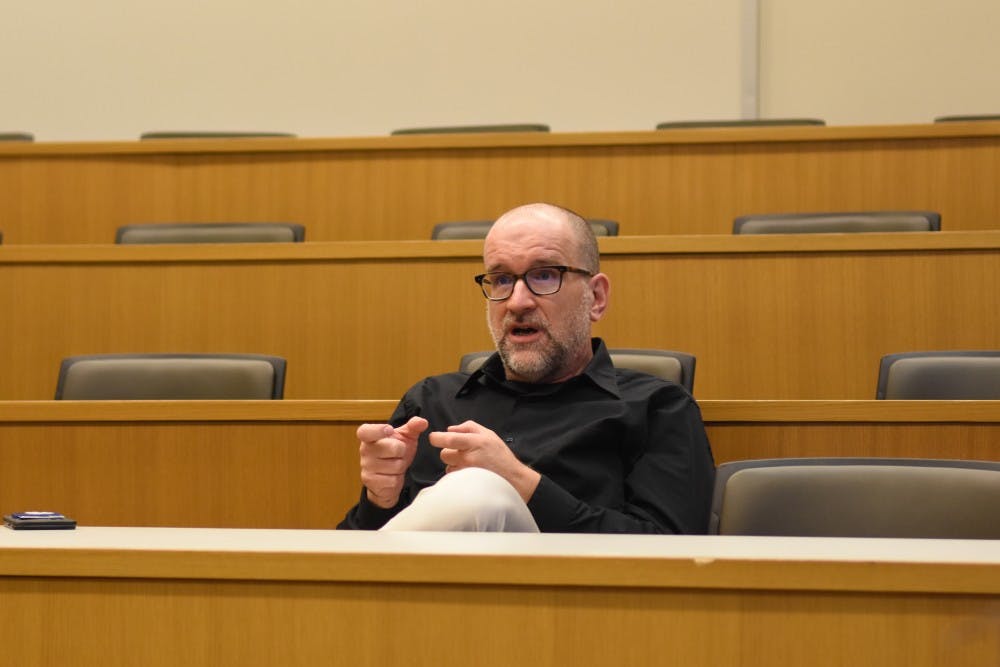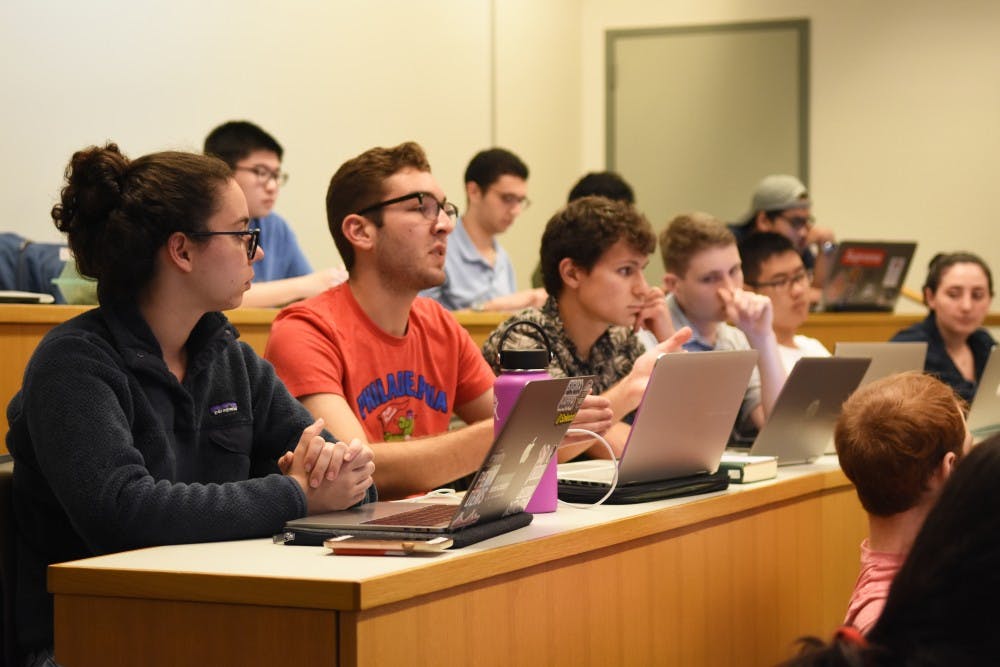
At the town hall meeting hosted by the Student Committee on Undergraduate Education, Executive Director for Education and Academic Planning Rob Nelson answered questions from students about the recent University policy that would require sophomores to live on campus.
Credit: Mona LeeAfter the University announced a new policy that would require sophomores to live on campus, Penn students responded en masse, citing issues concerning lack of cheaper housing options, the potential damage on the West Philadelphia community, and the risk of destroying Greek Life.
The town hall meeting Wednesday, which was hosted by the Student Committee on Undergraduate Education, intended to address these issues; however, the 18 students in attendance raised few concerns on the matter. Instead, those who spoke expressed support, saying the policy might be beneficial to campus in the long term.
Executive Director for Education and Academic Planning Rob Nelson, the administrator present at the town hall, addressed the issues students raised throughout the hour-long event without offering specific solutions. Rather, he emphasized that many details have not yet been decided, and the University is doing what they can.
While cost issues are more complicated for those on financial aid, students both receiving and not receiving financial aid have voiced hesitation about the increased expense of on-campus housing. Nelson conceded the concerns students have raised about the financial implications of the decision were valid.
"There are always going to be cheaper options off campus, and this decision does foreclose that option," he said. "If you want to share a room and live in a house without a kitchen and make choices like that, that's a cheaper option than college houses are ever going to be, and we are curtailing that choice for sophomores, and that's a truth that comes with this decision."
Rob Nelson is the Executive Director for Education and Academic Planning and represented the administration. 
Students emphasized that Penn needs to make sure on-campus housing for sophomores will remain affordable.
“I think [Penn] really needs to think about what financial barriers exist for students, whether they [are] low income or wanting to reduce the amount of money that they have to pay for housing regardless," College sophomore James Nycz said.
In justifying Penn's decision, Nelson also cited the fact that most of Penn’s peers have second-year housing. For example, Yale and Princeton require sophomores to live on campus. However, other schools like Columbia, Cornell, and Dartmouth, however, only require freshmen to live on campus.
During the town hall, students also talked about aspects of on-campus living that they liked, highlighting benefits like the Quad's study rooms and the high rises' computer labs.
Engineering senior Ross Schneider also said the new announcement will reduce stress for sophomores.
“[Students] don’t need to worry about finding off-campus housing, [and] the college houses offer a lot of amenities academically and socially that you just can’t find off campus,” Schneider said.
Schneider also said living in college houses will help sophomores stay focused.
“It’s another motivator, I think, for people to stay academically motivated and engaged in the Penn community,” Schneider said.

Nelson affirmed that a decision was made early on that sophomores would not be required to take part in a meal plan. In addition, he added that Penn has calculated that they have enough beds to house all freshmen and sophomores in the year 2021, citing data available online on Penn Connects, a development plan for Penn's campus launched in 2006.
However, the occupancy of college houses is currently around 97 percent, and no rooms are available for occupancy in the high rises, Executive Director for Business Services Doug Berger wrote in an email statement to The Daily Pennsylvanian.
Other students raised concerns about room selection. While sophomores now do not get to pick their rooms or dorms, Nelson said the school is entertaining the idea of allowing sophomores to choose where they want to live now that they have to live on-campus.
Nelson also talked about how Penn is trying to rethink what residential living means, recalling his experience working previously in Harrison at a time when freshmen were allowed to live inside.
Nelson remembered that on the two floors on which freshmen lived, students were active and interacting in the lounges, but if he went to upperclassmen floors above, students would be inside their rooms.
SCUE, a part of the Penn student government, hosted the event inside one of the lecture halls at Huntsman Hall on Oct. 10. SCUE meets with Penn administrators regularly to represent student concerns on academic issues, especially when new University policies are made.
Students were emailed on Oct. 9 about the event to be held the next evening. Forty-one people ended up coming to the event along with 22 SCUE members, Chair External of SCUE and the event moderator Justin Bean said.
The event’s format included students sharing their thoughts and interacting with one another, with Nelson joining the conversation to answer specific student questions and respond to student opinions.
The Daily Pennsylvanian is an independent, student-run newspaper. Please consider making a donation to support the coverage that shapes the University. Your generosity ensures a future of strong journalism at Penn.
Donate




